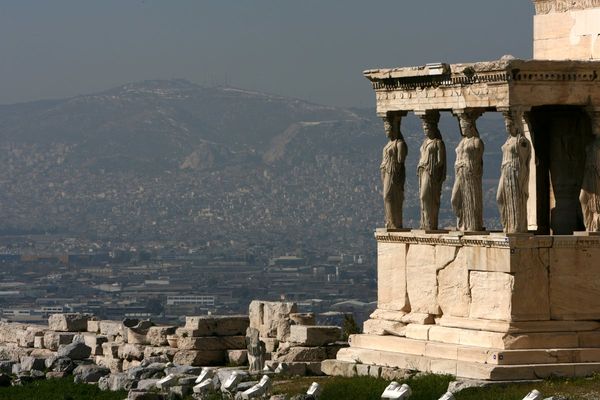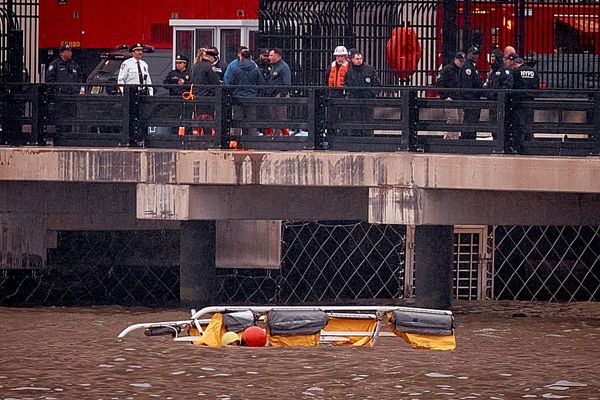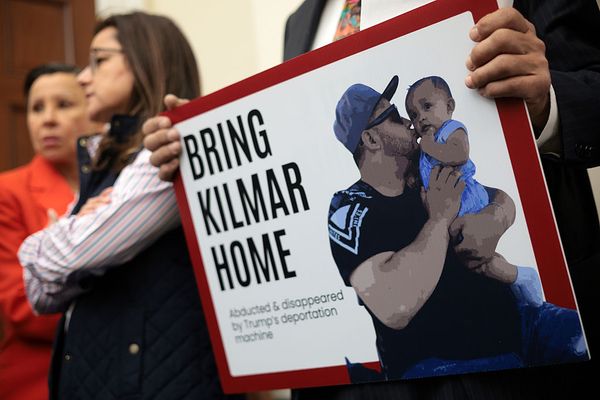
Alison Hammond and I first meet in a production kitchen at Pinewood Studios, where she is rinsing a teacup and recounting a near-fall she had moments before. In truth, I hear her before I see her, such is the power of her cackle. Several other women are in the kitchen with her and they, too, are laughing, so the atmosphere is loud and raucous and, for a visitor walking in cold, mildly startling.
It is mid-July. She is filming The Great Celebrity Bake Off, an offshoot of the main series that airs in December and is Christmas-themed. The Bake Off tent, which is attached to the production kitchen, is decorated with baubles. Through its windows I can see a thin blanket of artificial snow. Hammond is wearing a long purple dress and a face of makeup and seems fit for a party.
This is her second year as a Bake Off presenter, a role she took over from Matt Lucas and which has confirmed her position among fans as a national treasure. Her appointment is the culmination of a hard-won 22-year television career that began when she was cast in the third series of Big Brother. When she was approached by the Bake Off team, she warned, “I can’t do anything other than Alison.” To her surprise, the response was positive. “They were like, ‘Yeah, that’s what we want.’ So I go in and I do me. Isn’t it good?”
The Great British Bake Off is filmed in the grounds of a country home in Berkshire. The celebrity version is shot immediately afterwards, here on a Pinewood lawn, in a smaller version of the same tent. Presenting both shows involves a gruelling, months-long production schedule, though I see no signs of tiredness in Hammond, whose enthusiasm is boundless in a way I recognise from television, nor in her Bake Off co-presenter, the comedian Noel Fielding, who is typically quieter and more outwardly studied.
Hammond characterises her partnership with Fielding as “a seamless, beautiful partnership that just kind of works”. For a while, I sit in front of a wall of monitors and watch them perform on set together, exploring this or that avenue for comedic content, speaking with the bakers, offering reassurance when something is not quite right. Fielding has described his role on the show as “pastoral”. Hammond agrees. “It’s about the bakers,” she says, then considers briefly. “You want to kind of keep them calm. And I can, I think. I’m a calming influence. It’s the care you have with people. And I do care.”
Bake Off is a warm hug of a show and Hammond is a natural hugger. When we are introduced she refers to me as “Mr Journalist” and pulls me into an embrace. Every now and then while I am watching her on the monitors she slips away from filming and appears in front of me, wanting to chat. Once she comes to tell me the full story of her earlier near-fall. Next she appears to confirm we are to meet again at a later date. “OK, Mr Journalist!” she says when I nod. Soon after that she turns up holding trays of food meant for the crew. “Bruschetta?” she asks. “A biscuit?” (“We have Alison give out the snacks,” a producer jokes.)
Later, when she has left the set and the atmosphere has become noticeably quieter, but less exciting, I ask the producer what makes Hammond a good presenter. “Sometimes the crew is a bit tired,” she says, “and Alison will walk in and bring everyone up.” She and many others think of Hammond’s remarkable enthusiasm as her biggest professional strength. “It’s great at work,” the producer says. “But it must be a nightmare at home.”
Hammond and I meet again a week later in London. It is a bright hot Friday afternoon. She has spent most of the day in a photo studio honouring press commitments for Bake Off. Before that she presented an episode of This Morning, where she has been working on and off for two decades. When This Morning’s principal hosts are away, She often fills in, alongside Dermot O’Leary; since 2020, the pair have presented the show together every Friday. When I greet Hammond now she is warm, but less buoyant than she was in the tent – I notice only a little of her onscreen enthusiasm. Then she slumps in a chair opposite me.
Hammond is 49. In many ways Bake Off has been life-changing. “I went to Wimbledon the other day,” she says. “I never got invited to Wimbledon. And some random American guy comes up to me and says, ‘Oh my God, are you Alison from the baking show?’” Her first series was a success, but afterwards she “needed to decompress”. It will be the same this year. “As you go further through the experience you tend to care more.” Last season, she was surprised to cry when the bakers left. “I was like, ‘What is going on?’”
I ask why she thinks she was chosen for the role. “I don’t know,” she says, and then, “I don’t think anyone else wanted to do it.” Later she adds, “Listen, I’ve been talking to the general public for 22 years. It’s what I love.”(At Pinewood, a longtime Bake-Off staffer told me, “I don’t think even Alison knows how much we wanted her.”) This Morning, where Hammond became a reporter in 2002, has brought her to a wide audience. But Bake Off is different. “It’s worldwide,” she says. “It’s an institution, bigger than anything I thought I’d do.”
Hammond was raised in a council house in Kingstanding, a Birmingham suburb, and has one of the finest Brummie accents on television. Her parents immigrated, separately, from Jamaica, but did not live together. Her father worked as a bodyguard for Muhammad Ali whenever the boxer visited England (three of his children have “Ali” in their name). She has described him as “a big man with a big presence”, but he was not often around. “My dad would arrive periodically, show his face, and go back to Jamaica. Which was weird, because he used to pretend he was the best dad in the world.” Still, he was proud of her. When she visited Jamaica, “He’d drive me around asking people, ‘Do you know who this is?’ And they’d say, ‘That’s your daughter, Mr Hammond.’”
In her memoir, You’ve Got to Laugh, published in 2022, she writes that she does not hold her father’s absence against him. “People are people,” she says now. “We can’t rely on them.” Hammond says this without ill feeling. Then she adds, “And it didn’t bother me because I had my mum.”
Hammond has written that she was “obsessed” with her mother, Maria, who raised her and a half-brother and half-sister alone. When I bring this up, she says, “I was obsessed, yes,” and also, “I would always be at my bedroom window waiting for her car to come around the corner.” The obsession was reciprocal, she says. “I think she felt guilty my father wasn’t around, so she would always give me more than my brother and sister, more attention. I was spoiled, because they had theirs around.”
Hammond describes her mother as a grafter. “She had a council house, but she never claimed the dole.” Instead, she held several jobs – as a nurse, a casino cashier, an usherette, a Tupperware manager and a film and TV extra – often simultaneously. She could tell how well her mother was doing by how many boxes of Tupperware she had to climb over in order to reach the bathroom.
On the phone to me, Dermot O’Leary praised Hammond’s work ethic and grit. Hammond says she developed it from her mother, a single parent who was both “mum and dad” and a solo provider. “She worked so hard and she was so good at it.” Hammond believes that hard work is “in the blood”.
In her memoir, she writes it would be impossible not to be positive and full of energy having grown up around her mother. “She used to sing,” she says. “The house would be filled with laughter. People would come over, she’d cook.” Hammond’s home was often visited by Black women who influenced her – she called them aunties. “Everybody arrived looking stylish,” she has written. They would listen to reggae, calypso and Abba; furniture would be moved to make way for dancing. She learned a lot, “in the sense of strong women looking after women, women teaching women”. The house became central to many lives. Even when her mother later became unwell, she “wanted everyone over,” Hammond says. “I was like, ‘You’re dying, mum.’ And she was like, ‘Let them come, let them come.’”
Her mother was diagnosed with cancer in 2019, and died in 2020, having contracted sepsis. Her father died six months later. She was with her mother in her final moments. When she eventually left the hospital, at 6am, a fan approached cheerfully and asked for her picture. “I’ll be honest with you,” she writes in her book. “I wasn’t in the mood to have a photo with this woman. But I thought, You know what? It will make this woman happy. It’ll make her day.” Hammond obliged. “I smiled in the photo,” she goes on, “but behind the smile there was such sadness.”
When I ask about life since her mother’s death, she describes “a huge, gaping hole – still”. Her mother influenced every part of her life. “I’d go to her about everything” – including men – “and she’d give her opinion. She’d say, ‘He’s not for you, Alison. He doesn’t bring anything to the table.’” She is now reported to be in a relationship with a younger man from Russia.
Hammond was raised Christian. When she was young, she was encouraged to have a Bible with her at all times. “Every morning we would have to say ‘Thank you,’” she recalls. “Literally a ‘thank you’ to God for waking us up.” The practice taught her gratitude, which in turn has encouraged her to “embrace and love life, genuinely.” When I ask what she feels grateful for now, she replies, “For my body. I think my body is incredible. And I’ve had a baby and he’s very healthy.” Hammond’s son, Aidan, is 19. She split amicably from his father not long after he was born. Like her mother, she has developed a successful career while raising a child as a single parent, another experience for which she is grateful. Gratitude, she says, has “changed my perspective on everything. You go, ‘Oh, yeah, this is a gift.’”
When Hammond was a girl, her mother dreamed of becoming an actor and she encouraged her to be one, too. When she was six, she appeared in a film called Artemis 81, in which she can be seen slumped in a car (“We had to pretend to be dead”). She later joined the Central Junior Television Workshop, a drama school in Birmingham, and auditioned for acting parts. “It was being in front of other people that thrilled me,” she says. “I would just show up in front of a camera.” Even when she was very young, Hammond liked to perform. “I’d do cartwheels, though I was a big girl. And I liked the fact that people would say, ‘Wow, look how big you are – and you can do that!’ I liked surprising people.”
As a child, she was diagnosed with dyslexia and she was a late reader. At drama school she struggled to read scripts spontaneously, which caused her to miss out on roles. Reading aloud can still make her nervous. But she was a fast learner – “You could show me something once and I’d be able to do it” – and she had a remarkably positive attitude. “I’ve seen those people who were really intelligent, but whose attitudes sucked and, because they didn’t have the attitude, they didn’t get anywhere.” Enthusiasm, she says, “will propel you through anything.”
In her 20s, she worked summers as an entertainer in a Tunisian hotel resort. In England, she took odd jobs, but “I’d get bored, work a while, move on to something different.” When a friend mentioned Big Brother, then a relatively new reality TV programme, she was £4,000 in debt. Were she to win the show, she would earn £70,000. As her application, Hammond sent in a home videotape of her impersonating a police officer on a night out in Newquay.
Hammond was the second contestant to be evicted from the Big Brother house in 2002. She had earned a fanbase by jumping on, and breaking, a picnic table in the garden, then half-denying the gaffe, hilariously, in the Diary Room. Contestants had been told they were liable to pay for any damage they caused and she was hoping to escape the bill.
For a while after her exit she was interviewed across radio and television. Then the next housemate was evicted and the attention diverted elsewhere – Hammond was in the house with Jade Goody and Adele Roberts, among others, who also became stars; she remains friends with the season’s eventual winner, Kate Lawler. After her exit, she returned to past employers for work, but they turned her away, citing her fame as disruptive, and she briefly signed on to the dole. She visited the job centre wearing a disguise, which didn’t work. When she left, a security guard she knew said, “All right, Al?”
A few months later, producers at This Morning asked her to present a regular diet segment. Soon afterwards she was invited to interview George Clooney, which birthed her career as a This Morning celebrity interviewer, a job she seems made for. She often only has five minutes to speak with celebrities, but the results are frequently hilarious and often well shared. She once began an interview with Denzel Washington with the line, “Badass, vigilante, big, Black, beautiful, scary, but that’s enough about me, babes,” immediately disarming one of Hollywood’s biggest actors. O’Leary told me he believes people underestimate Hammond’s talents as an interviewer: “her curiosity, her empathy,” and, though she is known to be someone who talks, her ability to be quiet in the right moments.
A few days before we meet, Hammond had gone viral for sharing that she has nude pictures of herself around her house. The publicity does not seem to bother her. She has gone viralcountless times throughout her career , often for some kind of gaffe: getting caught on a door handle during a live This Morning segment, accidentally pushing a colleague into the water at Liverpool’s Albert Docks. She is frequently celebrated in the press. But she is also routinely criticised, in the tabloids and across social media, and the criticism is often vitriolic. Hammond is a rarity in television: a big, Black woman with a regional accent. It can seem as though this is too much for some. When I ask if she feels the criticism she receives is sexist, or racist, she interrupts, “Or sizeist?”
“Or sizeist,” I agree. “Ultimately I don’t care what other people think,” she says. “That sounds like it doesn’t bother me. It does. But I think I’m good enough and it’s me I want to impress.” She has learned there are viewers who will never like what she does, but that “most people who criticise others don’t love themselves”. Later she adds, “I mean, I’m happy plodding along in my beautiful Black skin in my big chubby body.”
In 2007, she was left unused by This Morning and had no other work lined up. “There was a time when I couldn’t pay my mortgage,” she says, “and I was really famous.” She got a job at the local hairdressers. If a customer recognised her, she would say she was helping out, then “I’d answer the phone, do a few blow dries.” Aidan, still very young, was at home; her mother helped them financially. When she recalls the story, she begins to cry, then goes on. “It’s not all good all of the time. But I was all right, you know? That’s television, it’s fickle and it’s part of my journey, part of my power.” She says Bake Off might not want her back next year, “and that’s OK. I know I’ll be OK, because I’ve been OK before. I’ll go and work at Tesco and people will still love me.”
Hammond moved house not long ago and says, “I feel I deserve it, I’ve worked hard for this.” Recently she has been considering working less – perhaps there are things she could do other than television. Last month, she announced the publication of a romance novel. “When my mum passed I had to ask, ‘Right, why am I doing this? Is this who I am?’” She realised that “I’m still doing it for her, I’m still living her dream. And I know she’s watching. She told me before she died: ‘I’ll be watching, Alison.’ I said, ‘Yeah, but not all the time. Not when I’m with a fella.’” She lets free a big giggle, then adds, “She said, ‘I’ll be there.’” ■
The new season of The Great British Bake Off returns next month on Channel 4







